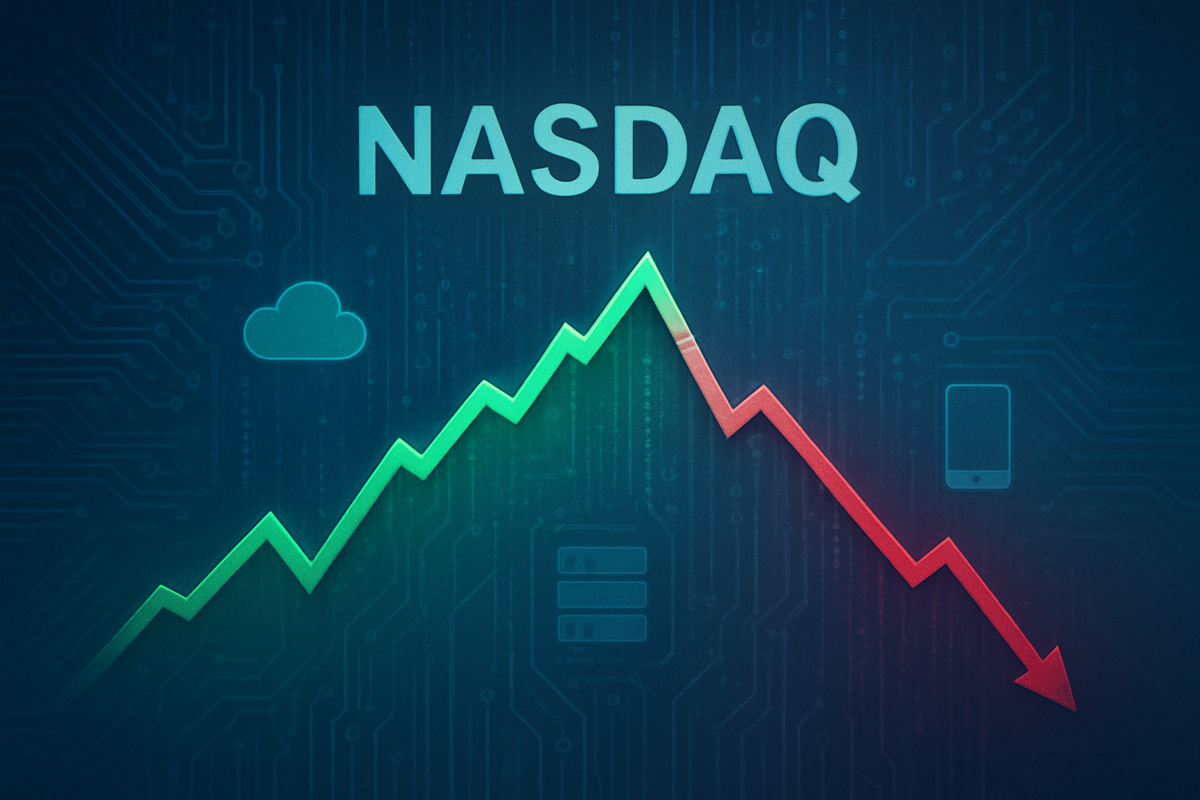
The Nasdaq Composite Index experienced a modest uplift on Friday, offering a glimmer of relief to investors. However, this late-month surge was insufficient to avert what is shaping up to be a losing November for the technology-heavy index. This anticipated monthly decline signals a period of reassessment for the tech sector, raising questions about the sustainability of recent growth trends and the broader implications for public companies deeply intertwined with the index's performance. As the market navigates evolving economic landscapes, the Nasdaq's struggle suggests a potential shift in investor sentiment, prompting a closer look at the factors driving this volatility and what it means for the future of technology stocks.
Unpacking the Nasdaq's November Performance
November 2025 has proven to be a challenging month for the Nasdaq Composite, which, despite a positive close on the final Friday, is poised to record a monthly loss. This performance contrasts with earlier periods of robust growth for the index, which has often been seen as a bellwether for innovation and technological advancement. The specific details reveal a market grappling with mixed signals: while certain high-flying tech companies continue to demonstrate resilience, a broader retrenchment appears to be underway. The timeline leading up to this moment includes a series of macroeconomic data releases, shifting interest rate expectations, and ongoing geopolitical concerns that have collectively contributed to investor caution. Key players, including institutional investors and major tech company executives, are closely monitoring these trends, with initial market reactions indicating a move towards more defensive positions and a re-evaluation of growth stock valuations. The anticipation of the Federal Reserve's stance on monetary policy, coupled with inflation concerns, has likely played a significant role in tempering enthusiasm for riskier, growth-oriented assets like many tech stocks.
Tech Giants Face Scrutiny: Winners and Losers in a Shifting Market
A losing month for the Nasdaq invariably puts the spotlight on the technology companies that comprise a significant portion of its weight. Large-cap tech behemoths, often referred to as the "Magnificent Seven" or similar groups, such as Apple (NASDAQ: AAPL), Microsoft (NASDAQ: MSFT), Alphabet (NASDAQ: GOOGL), Amazon (NASDAQ: AMZN), Nvidia (NASDAQ: NVDA), Meta Platforms (NASDAQ: META), and Tesla (NASDAQ: TSLA), often dictate the index's overall direction. While these companies possess strong fundamentals and diverse revenue streams, a broader tech downturn can still impact their stock performance, albeit often with more resilience than smaller firms. Investors might see a flight to quality, favoring established players with solid balance sheets over more speculative growth stocks.
Conversely, smaller, high-growth technology companies, particularly those in emerging sectors or those yet to achieve consistent profitability, are often more vulnerable during periods of market uncertainty. These companies rely heavily on investor confidence and access to capital, which can become scarcer and more expensive when the Nasdaq falters. Sectors such as pre-profit software-as-a-service (SaaS) providers, nascent biotech firms, or early-stage renewable energy tech companies might experience more significant drawdowns. The ability to innovate, maintain strong customer acquisition, and demonstrate a clear path to profitability will be crucial for these companies to weather the current market sentiment.
Broader Implications and Historical Context
The Nasdaq's struggle in November 2025 is not an isolated event but rather fits into broader industry trends marked by a recalibration of growth expectations and increased scrutiny on valuations. After several years of unprecedented growth fueled by low interest rates and accelerated digital transformation, the market is now contending with a potentially higher-for-longer interest rate environment and persistent inflationary pressures. This environment typically makes future earnings less valuable in present terms, impacting the valuation models for growth stocks. The ripple effects extend beyond direct competitors, influencing venture capital funding, mergers and acquisitions activity, and even consumer spending patterns on technology.
Regulatory bodies globally are also increasing their oversight of the tech sector, particularly concerning antitrust, data privacy, and artificial intelligence ethics. This regulatory scrutiny, while not directly causing the Nasdaq's monthly loss, adds another layer of uncertainty for tech companies, potentially impacting their growth strategies and operational costs. Historically, periods of Nasdaq underperformance have often coincided with shifts in economic policy or significant technological transitions. For instance, the dot-com bust of the early 2000s and the more recent tech correction in 2022 both served as reminders that even seemingly invincible sectors are subject to market cycles and economic realities. Comparing the current scenario to these precedents suggests that while a significant crash might not be imminent, a period of more moderate, discerning growth is likely.
What Comes Next: Navigating the Tech Landscape
Looking ahead, the short-term outlook for the Nasdaq and tech stocks suggests continued volatility as investors digest incoming economic data, corporate earnings reports, and central bank communications. In the long term, however, the fundamental drivers of technological innovation remain robust. Companies that can demonstrate strong profitability, efficient capital allocation, and a clear competitive advantage are likely to emerge stronger. This might necessitate strategic pivots for some tech firms, focusing more on cost optimization and sustainable growth rather than aggressive expansion at any cost.
Market opportunities may arise in sectors that are less sensitive to interest rate fluctuations or those that offer essential services, such as cybersecurity or specific enterprise software solutions. Additionally, the ongoing advancements in artificial intelligence (AI) and other transformative technologies could present new growth avenues, provided companies can commercialize these innovations effectively. Potential scenarios range from a quick rebound if economic conditions stabilize and inflation recedes, to a prolonged period of sideways trading or even further corrections if macroeconomic headwinds persist. Investors should prepare for a market that prioritizes tangible results and resilient business models over speculative potential.
Comprehensive Wrap-up: A Maturing Tech Market
In summary, the Nasdaq's anticipated losing month in November 2025 serves as a critical inflection point for the technology sector. It underscores a shift from an era of unrestrained growth to one demanding greater financial discipline and a clearer path to profitability. Key takeaways include the growing influence of macroeconomic factors on tech valuations, the increased differentiation between established tech giants and speculative growth stocks, and the ongoing impact of regulatory oversight.
Moving forward, the market will likely reward companies that exhibit strong fundamentals, adapt to evolving economic conditions, and innovate responsibly. Investors should closely monitor interest rate trajectories, inflation reports, and the quarterly performance of key tech players. The lasting impact of this period may be a more mature and discerning tech market, where sustainable business models and prudent financial management are valued above all else. This environment calls for a strategic and patient approach from investors, focusing on long-term value rather than short-term fluctuations.
This content is intended for informational purposes only and is not financial advice







